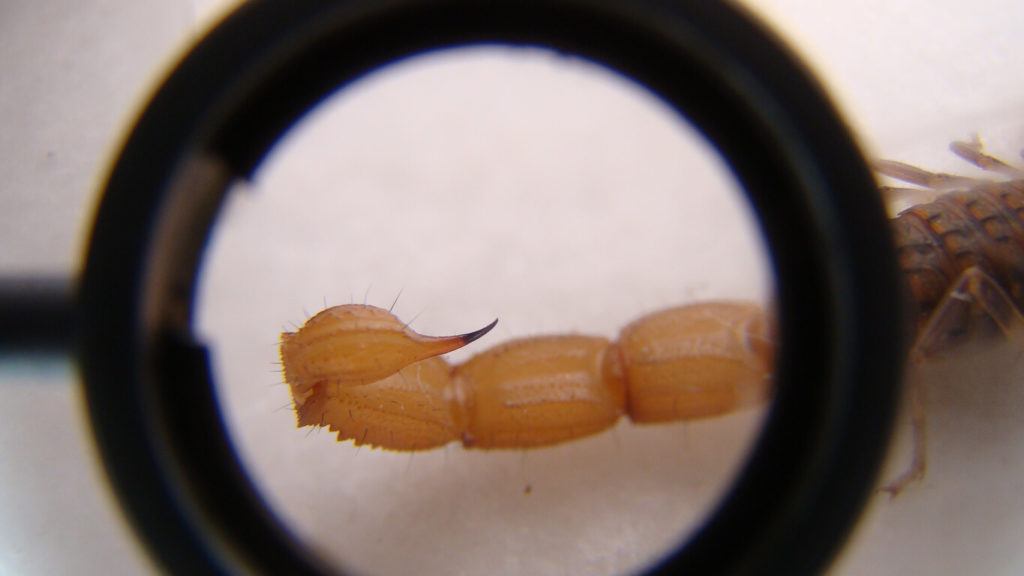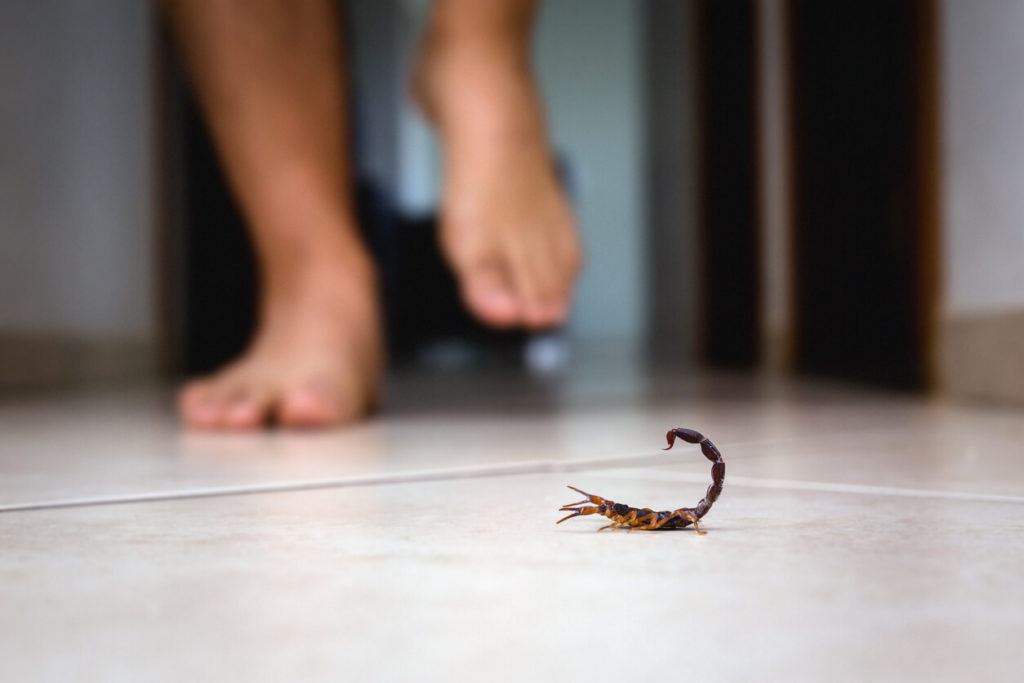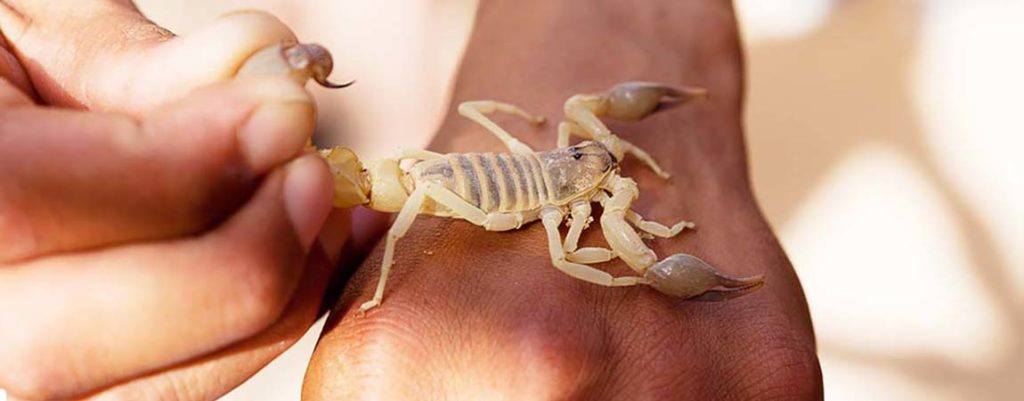
Scorpions stings are rarely fatal, but they can cause troublesome pain and swelling. Symptoms of a scorpion sting are similar to bee stings or spider bites, but they have distinct side effects that are telltale signs of a scorpion.
Read on to learn more about scorpions and how to identify when you’ve been stung by a scorpion from our Las Vegas pest control team.
Learn about our Las Vegas scorpion removal and prevention services by contacting our team today!
What Are Scorpions?
Scorpions are considered predatory arachnids. They have eight legs and are easy to recognize with their pinchers and tail that curves over their back. In the United States, scorpions can be found in the southwest, where the climate is warm and dry, such as:
- Nevada
- Arizona
- California
- Texas
- Utah
- New Mexico
What Are Common Types of Scorpions Found in the U.S.?
There are about 90 different species of scorpions in the U.S. Of these species, there are three common scorpion types found in the Southwestern United States, including:
1. Bark Scorpion (Centruroides Sculpturatus)
As one of the most common and venomous scorpions, bark scorpions thrive in communities and can quickly invade your property. These have a skinny tail, usually light yellow or tan, and are about three inches long.
2. Striped Tail Scorpion (Paravaejovis Spinigerus)
With an easily identifiable striped tail, this common scorpion is not a great climber and, therefore, less likely to be found in homes. They have a broad tail and average three inches in length. Their venom is less potent than other types of scorpions, but their sting is no less painful.
3. Giant Hairy Scorpion (Hadrurus Arizonensis)
One of the largest species in the United States can grow up to 8 inches long and is known for its extremely large and intimidating pinches and stinger. While they are aggressive hunters, their venom is weaker than other species.
How Does a Scorpion Sting Look?
A scorpion sting can look similar to a spider bite or a bee sting. The main difference is that scorpion stings are often accompanied by pain, numbness, or tinging where the stinger contacts the skin.
If you think you may have scorpions in or around your home, don’t wait! Contact us today to see how we can help protect you and your loved ones.
What Does a Scorpion Sting Feel Like?

A person who gets stung by a scorpion can have a variety of reactions, from mild to severe. While most stings are mild, here are some symptoms to be aware of:
Mild Symptoms
About 85% of scorpion stings¹ are mild and may include symptoms like:
- Immediate pain, numbness, or stinging
- Redness
Moderate Symptoms
Around 10% of stings cause a more painful reaction, including:
- Painful shock waves
- Pain that travels up the leg or arm where the sting occurred.
Severe Symptoms
Only 5% of stings result in severe symptoms or allergic reactions such as:
- Muscle twitching
- Trouble swallowing or breathing
- Rapid eye movements
- Blurry eyesight
- Slurred speech
How Long Does a Scorpion Sting Last?
Scorpion sting symptoms usually begin immediately. Pain is most severe within the first two hours and gradually lessens over the following day or two. If you’ve been stung and are questioning what to do for a scorpion sting, it’s always best to contact a medical professional.
Have questions about how to prevent scorpions from getting into your home? Talk to one of our professionals and get some peace of mind.
How Do You Treat a Scorpion Sting?
If you’re wondering how to treat a scorpion sting, you can manage most scorpion stings at home with products you likely have on hand. Here’s what to do if a scorpion stings you:
- Clean the sting site with mild soap and water
- Apply a cool compress to reduce pain
- Take over-the-counter pain medication to ease symptoms
- Call your local poison control if you’re not sure what to do
- Check health information to ensure tetanus vaccine is up to date
Medically reviewed articles² state that most scorpion stings are minor and do not result in emergency care. However, a scorpion sting may produce a life-threatening situation in rare cases. The toxicity of the venom depends on the species of scorpion.
Who Is Most at Risk for Scorpion Stings?
For children and the elderly, getting stung by a scorpion may be more problematic. These victims tend to be more susceptible to the venom, possibly causing severe side effects and even a trip to the emergency room. Make sure to take note of sting symptoms and either call poison control or get medical help immediately if you’re concerned.
Can a Scorpion Sting Kill You?
If you found a scorpion in or around your home, it can be an alarming discovery that leaves you with questions like:
- What happens if a scorpion stings you?
- How bad is a scorpion sting?
- Can you die from a scorpion sting?
So, are scorpion stings deadly? In the United States, deaths due to a scorpion sting are rare. In fact, in the last 50 years³, no one has died of a scorpion sting in the U.S. Some very dangerous scorpion species, such as the death stalker (Leiurus Quinquestriatus), produce an excruciating sting but would not usually kill a healthy adult.
 Do Scorpions Die After Stinging?
Do Scorpions Die After Stinging?
Unfortunately, scorpions can sting more than once, but their venom gets depleted with each sting. If you ever encounter a scorpion or are stung by one, the best thing to do is move away quickly. See the information above for more on how to neutralize a scorpion sting.
Professional Scorpion Pest Control in Las Vegas
Scorpions are not creatures you want to mess with. If you suspect one in your home or on your property, get help from professional scorpion control and get them out before you have the unfortunate experience of coming across one.
We’re here to help! Contact us today for a free estimate on scorpion maintenance and preventative pest control services.
Sources:
¹Seattle Children’s Hospital. (13 February 2022). Scorpion Sting. Retrieved 14 February 2022.
²Shamoon, Z., Peterfy, Ryan J., Hammoud, S., Khazaeni, B. (12 August 2021) Scorpion Toxicity. Stat Pearls, NCBI. Retrieved 14 February 2022.
³Dominguez, K. Tarantula Bites and Scorpion Stings. National Capital Poison Center (NCPC). Retrieved 14 February 2022.
